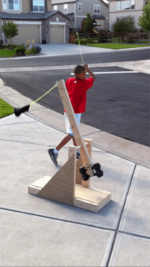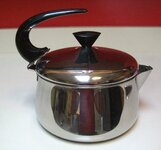Well maybe I came up with a new element, like Tony Stark did, did you think about that?
Yeah, yeah, it should probably say "lead alloy" - maybe a nice mod could change that???
I don't fish, so no need for fishing weights, but a tabletop trebuchet sounds pretty cool!!
Title fixed, but now my posts just sound stupid!
A shot of my nephew a few years ago launching one I made.













